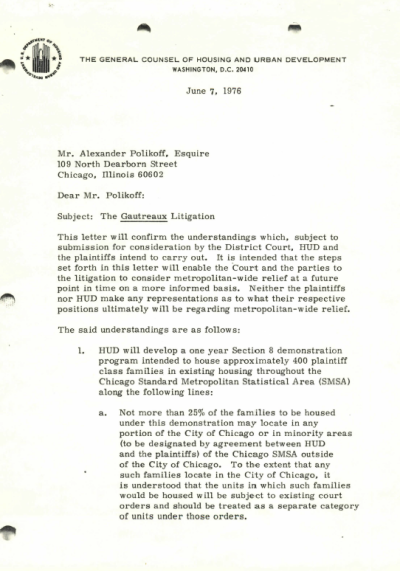The Gautreaux Program and Housing Mobility Beyond Chicago
This post is the final entry in our series on the Gautreaux digital archive, which examines important moments in the history of the Gautreaux lawsuit and considers how the case continues to influence housing policy both in Chicago and nationwide. The following post also complements our current blog series on Housing Mobility. –Torsten K. Edstam, Ph.D.
The Gautreaux Assisted Housing Program  resulted directly from the Supreme Court’s ruling that metropolitan relief was an appropriate remedial measure for discrimination in Chicago public housing. In the wake of that ruling, BPI and HUD agreed on a plan to provide plaintiff class families with special Section 8 rental certificates (later renamed Housing Choice Vouchers) and counseling assistance from the Leadership Council for Metropolitan Open Communities. Helping families move from poor, segregated areas into racially, economically diverse suburban communities, the Gautreaux Program was the nation’s first housing mobility program. By the time the Program ended in 1998, it had helped over 7,100 families (some 25,000 persons) relocate to neighborhoods that were safer and offered better job and educational opportunities.
resulted directly from the Supreme Court’s ruling that metropolitan relief was an appropriate remedial measure for discrimination in Chicago public housing. In the wake of that ruling, BPI and HUD agreed on a plan to provide plaintiff class families with special Section 8 rental certificates (later renamed Housing Choice Vouchers) and counseling assistance from the Leadership Council for Metropolitan Open Communities. Helping families move from poor, segregated areas into racially, economically diverse suburban communities, the Gautreaux Program was the nation’s first housing mobility program. By the time the Program ended in 1998, it had helped over 7,100 families (some 25,000 persons) relocate to neighborhoods that were safer and offered better job and educational opportunities.
In 1994 HUD launched the Moving to Opportunity Demonstration. In an effort to determine whether Gautreaux-like outcomes could be achieved in a randomized experimental context, MTO enabled over 4,000 families in Baltimore, Boston, Chicago, Los Angeles, and New York City to move from high-poverty inner city neighborhoods to lower poverty areas. The disappointing result, however, was that although participants in MTO experienced improved health, they did not show gains in employment or education. This caused policymakers to question whether neighborhood circumstances “mattered” for the lives of individuals, and as a consequence effectively blocked further expansion of housing mobility nationally. Only two other large Gautreaux-like mobility programs have since been mounted, one in Dallas and one in Baltimore, and each exists solely because of successful Gautreaux-type lawsuits against local housing authorities and HUD.
However, in early May 2015 Harvard economists announced a new study which, as the New York Times says, might “overturn the findings of Moving to Opportunity”. As Alexander Polikoff explained in our recent blog post on mobility, the new study will likely remove one of the major obstacles to the wider implementation of Gautreaux-style mobility. It remains to be seen, however, whether HUD will respond in a way that at long last truly fosters housing mobility.
Back To Blog